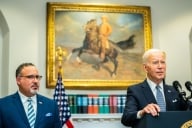You have /5 articles left.
Sign up for a free account or log in.
At first glance, Peter Drucker might seem an unlikely candidate to have published an academic novel. Famous for writing books such as Concept of the Corporation and The Effective Executive, Drucker was dubbed “The Man Who Invented Management” in his 2005 Business Week obituary. Drucker’s audience was to be found among the Harvard Business Review crowd, not the Modern Language Association coterie, and, not surprisingly, his two novels are no longer in print.
But the university he presented in his 1984 novel, The Temptation to Do Good, confronted some key questions that face higher education institutions in today’s unprecedented financial downturn: Are current practices sustainable? Have we strayed from our core mission? Will the liberal arts survive increasing budget pressures?
As these questions -- hardly the usual literary fare -- demonstrate, Drucker’s work is a rarity among academic novels. These texts typically provide a send-up of academic life, by making fun of intellectual trends through characters such as Jack Gladney, who chairs the department of Hitler studies in Don DeLillo’s White Noise, or by parodying the pettiness of department politics, as in Richard Russo’s Straight Man, in which one English professor’s nose is mangled during a personnel committee meeting, courtesy of a spiral notebook thrown at him by one of his peers. By contrast, The Temptation to Do Good is almost painstakingly earnest in its portrayal of Father Heinz Zimmerman, president of the fictional St. Jerome University.
Like other contemporary academic novels, The Temptation to Do Good depicts the problems of political correctness, the tensions between faculty and administration, and the scandal of inter-office romance. But St. Jerome’s problems are no laughing matter. Lacking the improbable events of other academic novels -- in James Hynes’s The Lecturer’s Tale, the adjunct-protagonist even gains super-human powers -- the plot of The Temptation to Do Good is completely plausible, and the problems above destroy a good man.
St. Jerome’s chemistry department decides not to hire Martin Holloway, a job candidate with a less-than-stellar research record. Feeling sorry for the soon-to-be-unemployed Ph.D., Zimmerman decides to recommend Holloway to the dean of a nearby small college. Zimmerman knows he shouldn’t interfere, but he feels he must do the Christian thing, and so, succumbing to “the temptation to do good,” he makes the call. Meanwhile, Holloway’s angry wife spreads unfounded rumors about a dalliance between the president-priest and his female assistant. The faculty overreact to both events, and although most of them come to regret it, Zimmerman’s presidency is brought down, and he is eased out by the church into a sinecure government position.
Often reading like an intricate case study of one university’s internal politics, The Temptation to Do Good aims to do more than that, too, raising questions about the purpose of higher education institutions writ large. Representing the contemporary university as a large, bureaucratic institution -- much like the companies that Drucker’s theories would shape -- The Temptation to Do Good portrays Zimmerman as a successful executive, one who “converted a cow college in the sticks” into a national university with a reputation unrelated to its religious roots. He even makes the cover of Time magazine for increasing his endowment by a larger percentage than any other university over the past five years.
Although some faculty recognize, as one physics professor admits, that they wouldn’t be able to do their research without the money he has brought in, many of them are also disenchanted with Father Zimmerman, CEO. The chemistry chair chose to come to St. Jerome because he expected it to be “less corrupted by commercialism and less compromised by the embrace of industry” than other institutions, which he realizes isn’t the case.
“We have a right,” says the chair of modern languages, upset over the abolition of the language requirement, “to expect the President of a Catholic university to stand up for a true liberal education.” In both cases, we see the ideals of a Catholic university being linked to the ideals of a liberal arts education, both focused on a pure devotion to the pursuit of knowledge seen as incompatible with Zimmerman’s expanded professional schools and intimate sense of students’ consumer needs. Can St. Jerome be true to both the liberal arts and the practical, professionalized realm at the same time?
This question is never resolved in the novel, but outside of his fiction writing, Drucker was deeply interested in the practicality of the liberal arts. In his autobiography, he discusses his deep appreciation of Bennington College, a school designed to combine progressive methods -- connecting learning to practical experience -- with the ideas of Robert Hutchins, the University of Chicago president and famed proponent of classical liberal ideals. William Whyte’s sociological classic Organization Man cites Drucker as saying that “the most vocational course a future businessman can take is one in the writing of poetry or short stories.”
Although Drucker was unusual in actually writing novels himself, he was not alone among business thinkers in expressing the values of the liberal arts. Tom Peters and Robert Waterman’s In Search of Excellence: Lessons from America’s Best-Run Companies describes an investment banker who suggests closing business schools and providing students with a “liberal arts literacy,” that includes “a broader vision, a sense of history, perspectives from literature and art.”
More recently, Thomas Friedman’s The World is Flat includes a section focusing on the importance of a liberal arts education in the new integrated, global economy. “Encouraging young people early to think horizontally and to connect disparate dots has to be a priority,” writes Friedman, “because this is where and how so much innovation happens. And first you need dots to connect. And to me that means a liberal arts education.”
Books like Rolf Jensen’s The Dream Society: How the Coming Shift from Information to Imagination will Transform Your Business, Joseph Pine II and James H. Gilmore’s The Experience Economy: Work is Theatre and Every Business a Stage, Daniel H. Pink’s A Whole New Mind: Why Right Brainers Will Rule the Future, and Richard Lanham’s The Economics of Attention: Style and Substance in the Information Age make these points more specifically, often showing how certain “literary” skills, such as storytelling and empathy, are crucial to success in the current time.
Out of the authors mentioned above, only Lanham is a humanities professor, and in a field (rhetoric) largely out of scholarly vogue today. “Let’s go back to the subject of English a moment. Of all subjects none is potentially more useful,” Whyte writes. “That English is being slighted by business and students alike does not speak well of business. But neither does it speak well for English departments.”
What’s significant about Whyte’s account -- along with that of Drucker, Friedman, and others -- is that none of them claim that colleges and universities should merely churn out students of technical writing or focus on the practicality of the composition course; instead they want students to think about narrative complexity and story-telling through the liberal arts. Whyte himself focuses on the study of Shakespeare and Charles Lamb.
However, instead of embracing these potential real-world allies, liberal arts disciplines have seemed to withdraw, letting others become the experts in -- and proponents of -- the relevance of their subjects. Consider, for example, that in January 2008, one of the most famous English professors in the world proclaimed on his New York Times blog that the study of literature is useless. Asserting that the humanities don’t do anything but give us pleasure, Stanley Fish wrote that, “To the question of ‘what use are the humanities?’ the only honest answer is none whatsoever.” The arts and humanities, Fish contended, won’t get you a job, make you a well-rounded citizen, or ennoble you in any way.
Not surprisingly, readers were appalled. Within the next 48 hours, 484 comments were posted online, most of them critical of Fish. The majority of these comments, from a mix of scientists, humanists, business people, and artists, could be divided into two categories: first, the humanities are useful because they provide critical thinking skills that are useful for doing your job, whether you’re a doctor or CEO; and second, the humanities are useful for more than just your job, whether that means being a more informed citizen or simply a more interesting conversationalist.
However, perhaps the most fascinating comments came from those who recognized Fish’s stance as a professional one: in other words, one that relates to attitudes toward the humanities held by practitioners inside the academy (professors), as distinct from those held by general educated readers outside it (the Times audience). “Let’s not conflate some academics -- those who have professionalized their relationship with the humanities to the point of careerist cynicism -- with those [...] still capable of a genuine relationship to the humanities,” said one reader. Another added that the “humanities have been taken over by careerists, who speak and write only for each other.”
In other words, while readers defend the liberal arts’ relevance, scholars, who are busy writing specialized scholarship for one another, simply aren’t making the case. This was an interesting debate when Fish wrote his column over a year ago; now in 2009, we should consider it an urgent one.
Traditionally, economic downturns are accompanied by declines in the liberal arts, and with today’s unparalleled budget pressures, higher education institutions will need to scrutinize the purpose of everything they do as never before. Drucker’s academic novel provides an illustrative example of the liberal arts at work: as Fish’s readers would point out, literature can raise theoretical questions that help us understand very practical issues.
To be sure, the liberal arts are at least partly valuable because they are removed from practical utility as conceived in business; the return on investment from a novel can’t be directly tied to whether it improves the reader’s bottom line.
But justifiable concerns among scholars that the liberal arts will become only about utility has driven the academy too far in the opposite direction. Within higher education, we acknowledge that the writing skills gained in an English seminar might help alumni craft corporate memos, but it is outside higher education where the liveliest conversations about the liberal arts’ richer benefits -- empathic skills and narrative analysis, for example -- to the practical world seem to occur.
Drucker and his antecedents may be raising the right questions, but these discussions should be equally led by those professionally trained in the disciplines at hand. In today’s economic climate, it may become more important than ever for the liberal arts to mount a strong defense -- let’s not leave it entirely in the hands of others.








